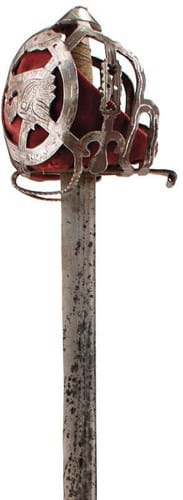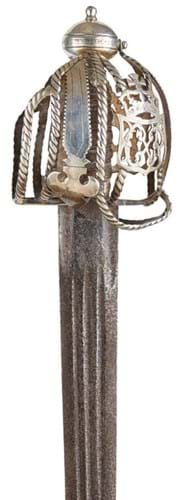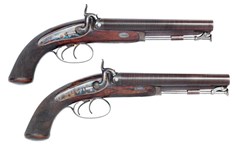The hilt featured two opposing Clan MacTavish crests of wild boars’ heads within garters, the latter bearing the clan motto non oblitus (not forgetful).
According to the cataloguer, this “scarce” clan basket hilt of characteristic Western Highland form “reflects the MacTavish relationship with the Campbell clan and is evocative of the final battle of the Jacobite Rebellion at Culloden [1746].” As followers of the Campbells, MacTavishes did not officially support the rising, but some did fight at Culloden allied with other clans.
The sword formed part of a large private collection from south-west England. The buyer was an international bidder via the internet.
At the races
The Lyon & Turnbull Scottish Silver & Applied Art auction in Edinburgh on August 14 includes a sizeable selection of Jacobite and related weaponry and items. Estimated at £30,000-40,000 is a silver-hilted presentation race prize basket-hilted broadsword.
Attributed to William Scott II, Elgin, c.1700-10, it comes from the collection of the late Baron Earlshall. It forms part of a very small group of race prize swords presented for the Huntly Races, held between 1695-1749 under the tenure of the 1st and 2nd Dukes of Gordon, after being granted the right by the Scottish Parliament. Termed the ‘Charles Fair’, this seems to have been in commemoration of King Charles II, and therefore a thinly veiled support of the Stuart/ Jacobite cause.
However, L&T notes: “That said, the races followed a form common throughout Scotland of race meetings ‘sponsored’ by the local council of gentry.
“As well as adding to the social and sporting calendar they were a means of attracting business and money to the area in the form of big-spending aristocrats and gentry who owned and ran the horses.”
















